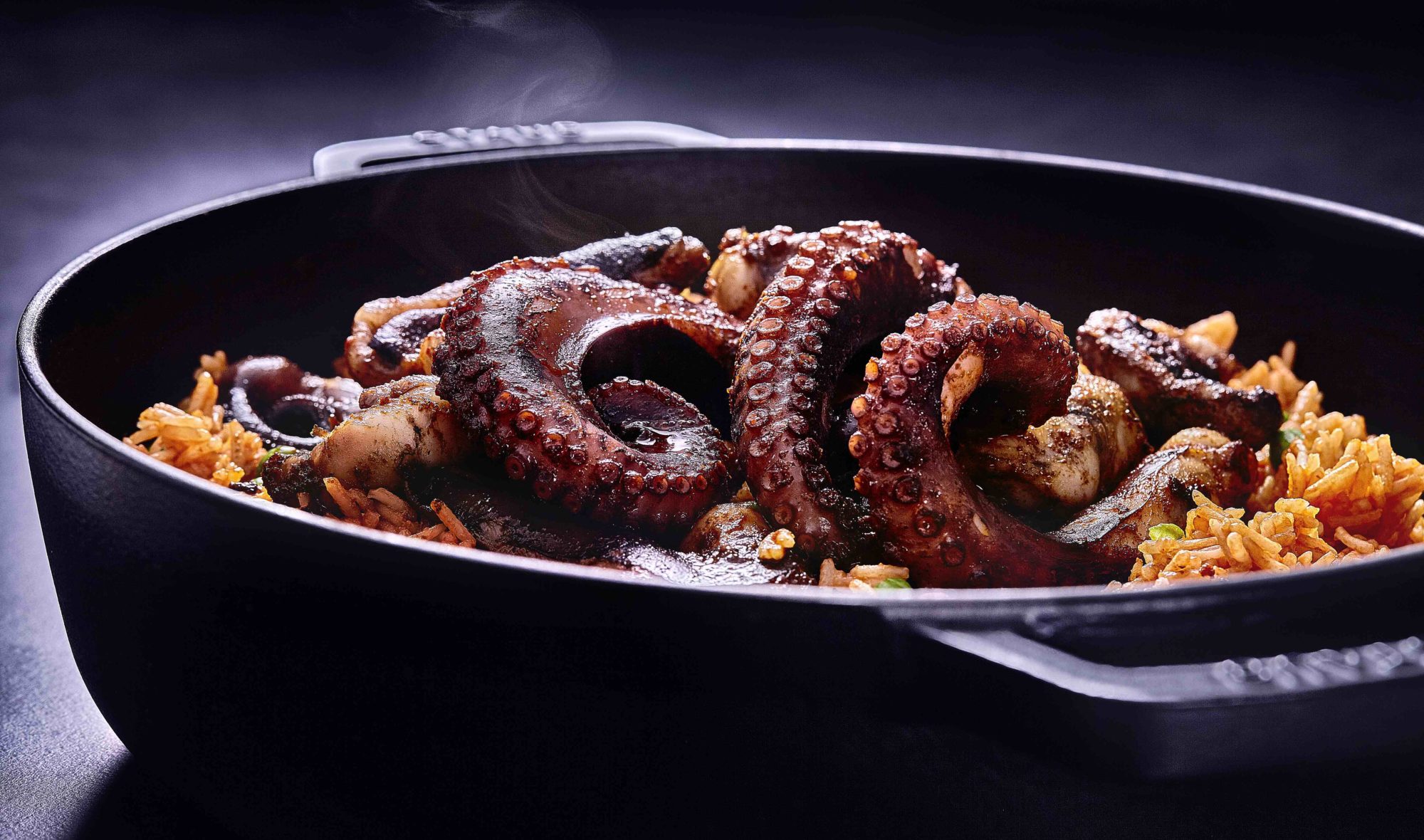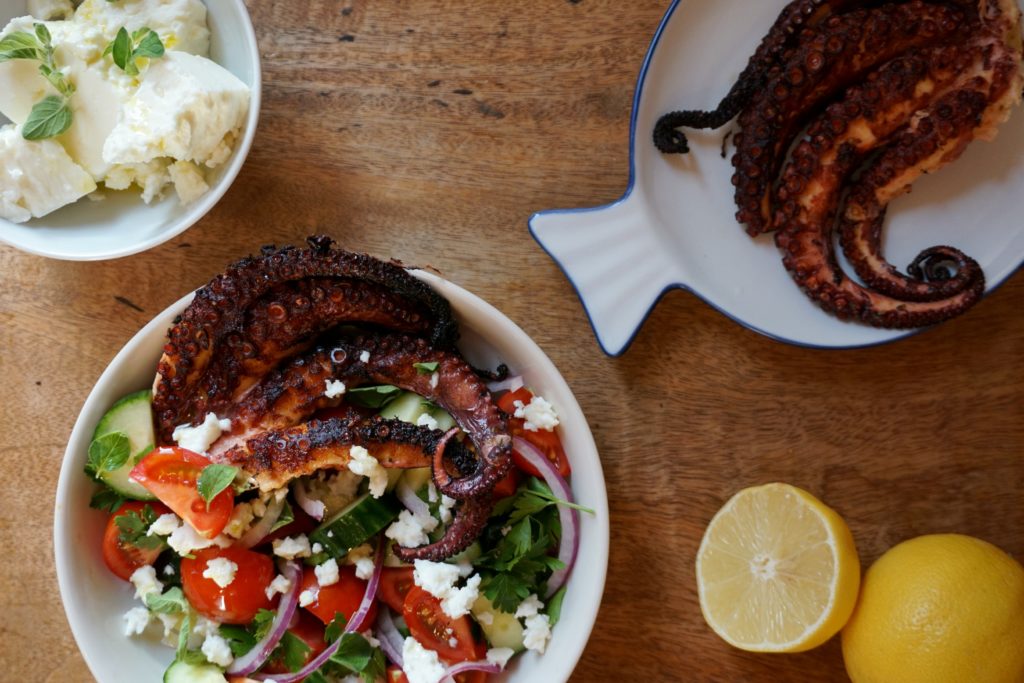Octopus


The octopus is a sea creature with a large head and eight suction cup-adorned arms that are often mistakenly called tentacles. The octopus is the largest member of the cephalopod family, which also includes squid and cuttlefish, and can grow up to 30 feet long. Octopus is extremely protein-dense and is also a rich source of vitamin B12, selenium, iron, copper, and vitamin B6. When cooked properly, octopus has a tender texture and slightly sweet, mild-tasting flesh. Octopus is found in oceans around the world and is particularly popular in Mediterranean and Japanese cuisines. Octopus is considered to be an aphrodisiac by many cultures, but this is only true if it is properly cooked. A properly cooked octopus will be a tender, sensual experience. Overcook it and it becomes rubbery and unpalatable, unfit for any human, let alone a lover.
The octopus is a sea creature with a proportionately large head and eight suction cup-adorned arms that are often mistakenly called tentacles. (Tentacles are long and thin and only have suckers at the end, while octopus arms are stronger and shorter and are suckered all the way up and down.) The octopus is the largest member of the cephalopod family (which also includes squid and cuttlefish) and can grow up to 30 feet long.
The head of the octopus contains all of the organs, including a beak-like mouth and an internal sack full of ink. This ink is used as a defense weapon, to obscure the path of predators, but is also used as a culinary additive.
Octopus is found in oceans around the world. They are chameleon-like and adopt the color of their environment, so can be found in a range of colors including grey, pink, black, brown, and beige.
Octopus is commonly eaten in the Mediterranean regions and is also popular fare in Japan. It is considered to be an aphrodisiac by many cultures, but this is only true if it is properly cooked. A properly cooked octopus will be a tender, sensual experience. Overcook it and it becomes rubbery and unpalatable, unfit for any human, let alone a lover.
Octopus comes in a variety of sizes, depending on the specific species and the age at which it was captured. An octopus captured for consumption ranges between several feet long to barely a few inches across. Generally, a smaller, younger octopus is more tender than a larger, older octopus.
When cooked properly, octopus has a tender texture and slightly sweet, mild-tasting flesh. Its meat tends to have a bronzed color on the outside but is white on the inside. Its arms are textured with rows of suction cups.
Depending on its original size, an octopus may be served whole or sliced.
Three ounces (about 85g) of cooked octopus has 139 calories, 25.4g of protein, 1.8g of fat, 3.7g of carbohydrates, and no fiber or sugar. Octopus is an excellent source of vitamin B12 and selenium, and a good source of iron, copper, and vitamin B6.
Octopus can be found fresh or more commonly frozen at seafood markets as well as at many larger grocery stores.
When choosing fresh octopus, look for specimens that look moist but not overly slimy, and have a mild, pleasing oceanic smell.
More commonly, octopus is found frozen and raw, either whole or in pieces. In this case, choose products that are well-sealed and are free of any additional ingredients. Always shop at stores you trust with good product turnover.
Fresh or cooked octopus will last in an airtight container in the fridge for about two days.
Alternatively, it may be kept in an airtight container in the freezer, either raw or cooked, for up to three months. Like shrimp and squid, octopus freezes well and this storage method doesn’t damage either its taste or texture.
Most octopus is sold frozen. Therefore, in order to prepare it, it must be thawed first, either in the fridge overnight or in a bowl of cold water.
The expression for cooking octopus is “two minutes or two hours”. This is about right; octopus is most delicious if cooked only for a few minutes, just until it has lost its translucency, or for a longer period of time (usually an hour or more) until it tenderizes. Anything in between and the octopus will be rubbery and tough to chew.
Here is one reliable method:
First, tenderize the octopus by simmering it in a light broth for an hour or so. (Poke it with a pointy knife to check it; when it enters easily, it is done). Drain the liquid, then slice the octopus into pieces and brush them with a mixture of olive oil, lemon juice, and minced herbs. Place the octopus pieces on a grill, and grill until crispy, about five minutes each side. Before serving, drizzle with a little extra olive oil, a squeeze of lemon, and a sprinkle of salt and pepper.

Octopus takes some time to prepare but most of the wait is passive, and the payoff is worth it: Octopus has a rich, slightly sweet, meaty flavor that crisps nicely and goes deliciously on an easily-thrown-together Greek salad.
Prep Time: 20 minutes Cook Time: 90 minutes Yield: 2 servings
First, pre-tenderize* your octopus: In a large pot, add octopus, wine, garlic, bay leaves, and enough water to cover the octopus completely. Bring water to a boil over high heat, then turn down to medium and simmer for about an hour, or until octopus is tender.
Drain the octopus and cut it into large pieces. Transfer the pieces to a bowl, and drizzle with two tablespoons of olive oil, the juice from half a lemon, and dried oregano. Toss to coat.
From here, you can cook the octopus either on the stovetop or on the grill:
On the stovetop, add a generous amount of olive oil to a skillet and wait until it is sizzling. Then, place the octopus pieces in the skillet and cook for a few minutes, or just until the skin gets crispy and caramelized. Then, flip over the pieces, and crisp up the other side. When they are done, remove from heat and transfer to a bowl.
On the BBQ, lay octopus pieces on a hot grill, and don’t disturb for several minutes, or until undersurface has crisped up and shows nice grill marks. Flip, and grill the remaining side. When they are done, remove from heat and transfer to a bowl.
To prepare the salad (which can be done while your octopus is simmering), add chopped tomatoes, cucumber, red onion, and feta cheese to a large bowl and toss to combine.
Divide the salad between two bowls, then top with crispy octopus. Garnish with fresh parsley and oregano leaves, and drizzle generously with olive oil and lemon juice. Season with salt and pepper to taste, then serve.
*Like squid, octopus should be cooked one of two ways: Low and slow or flash-cooked. Anything in between will yield a rubbery and unpalatable disaster. Simmering the octopus for an hour or so tenderizes the flesh so that it can later be grilled or pan-fried with a nice char without worry of it getting too tough.
Precision Nutrition’s Encyclopedia of Food expands every single month as we highlight new foods and showcase beautiful food photography. If you’d like to stay up to date, simply click this link. From there, we’ll send you a FREE copy of our recipe book. We’ll also let you know when new and delicious foods are added to the site.
The octopus is a sea creature with a large head and eight suction cup-adorned arms that are often mistakenly called tentacles. The octopus is the largest member of the cephalopod family, which also includes squid and cuttlefish, and can grow up to 30 feet long. Octopus is extremely protein-dense and is also a rich source of vitamin B12, selenium, iron, copper, and vitamin B6. When cooked properly, octopus has a tender texture and slightly sweet, mild-tasting flesh. Octopus is found in oceans around the world and is particularly popular in Mediterranean and Japanese cuisines. Octopus is considered to be an aphrodisiac by many cultures, but this is only true if it is properly cooked. A properly cooked octopus will be a tender, sensual experience. Overcook it and it becomes rubbery and unpalatable, unfit for any human, let alone a lover.